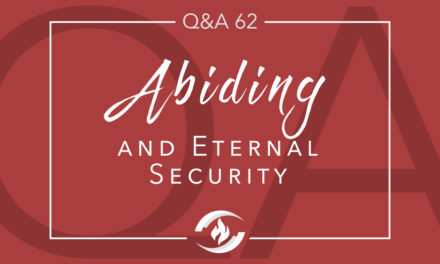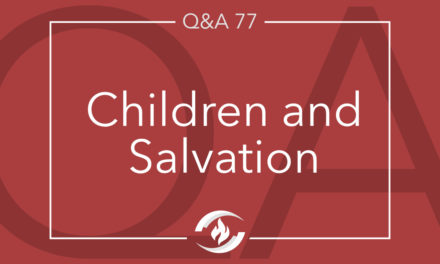Q.
Brother,
In local church prayer meetings, what level of involvement can women have when men are praying with them? Can women lead in prayer?
To further explain my question, I am preaching this week on the local church prayer meeting. I find that women were certainly present at the prayer meetings (Acts 1:14), but does that mean that the women led in prayer? When Paul singles out that males should pray all over the place (1 Tim. 2:8), is this an indication that women should not? Or, are the requirements of women that are given next (1 Tim. 2:9ff) an indication that women can lead in prayer? Is this “leading” in prayer a usurping of authority that this passage (and 1 Cor. 14) discusses so that women should be silent in the church? No doubt, even “silent partners” in prayer can accomplish a great deal, so either way, women could accomplish much in prayer meetings. Practically, this would impact whether a woman can “lead” in prayer such as in a formal worship service, but I am especially interested in whether or not they could “lead” in prayer in a corporate prayer meeting.
Nathan
A.
Hello Nathan,
Thanks for the practical, yet important question! To seek to answer this, let’s begin by considering the practice of the early church as specified in the inspired narrative in Acts, and then investigate some key instructional passages in the Epistles.
First, after Jesus promised the power of the Spirit and then ascended, the disciples met in the upper room. After listing their names the account says, “These all continued with one accord in prayer and supplication, with the women, and Mary the mother of Jesus, and with his brethren” (Acts 1:14). The text clearly says the meeting primarily involved “prayer and supplication.” The fact that the inspired record says “These all [disciples]…with the women, and Mary” contextually indicates the women participated in the prayer meeting, otherwise the reference to them seems irrelevant. It almost seems the text goes out of its way to say “prayer…with the women.” Nothing in the context itself would suggest the women did not pray with the men. While it’s possible to suggest the reference includes just their presence, or perhaps that they prayed silently, the specific reference with the women in the specific context of prayer gives the sense that they participated. The narrative specifies what was being done—prayer, and who was doing it—These all [disciples]…with the women.
Later in Acts when Herod imprisoned Peter, “prayer was made without ceasing of the church unto God for him” (Acts12:5). After God miraculously delivered Peter out of prison, “he came to the house of Mary…where many were gathered together praying” (Acts12:12). When Peter knocked at the door “a damsel came to hearken named Rhoda” (Acts 12:13). In this passage the account specifically says “many…praying.” Then the only two specific names of individuals given are two women. So we know women were in the gathering for prayer. Again, nothing in the context indicates that the women did not participate in the public prayer meeting.
A simple reading of the accounts in Acts 1 and 12, with no presuppositions, would lead one to believe that both men and women participated in the public prayer meetings. In this light, the prayer meeting in Acts 4 may have included women as well (Acts 4: 23-31).
Second, beyond the narrative accounts in Acts, the Epistles address this subject. Paul, under inspiration, instructs the church at Corinth regarding prayer (1 Cor. 11:2-6, 13). The context indicates Paul is addressing what takes place in the public assembly, especially since the next subject in the same chapter is the Lord’s Supper. Although there is debate over the meaning of head coverings in this passage, what is clear is that women prayed in the context of the public gathering.
The underlying reason is the status of all believers in the spiritual realm in contrast to the physical realm. “Saints” (implying male and female) have been blessed with “all spiritual blessings in heavenly places in Christ” (Eph. 1:1-3). The “heavenlies” in Christ refers to the spiritual realm where every believer sits “together…in Christ” (Eph. 2:6). Believers are encouraged to come boldly to this “throne of grace” (Heb. 4:16). This certainly describes prayer. In this spiritual realm the inspired text explicitly says “there is neither male nor female…in Christ” (Gal. 3:28). Therefore, in the spiritual realm of prayer, both male and female can participate.
What about the injunction “Let your women keep silence in the churches: for it is not permitted unto them to speak” (1 Cor. 14:34)? However, the context is not prayer. Following the statement that God is not the author of confusion in the previous verse, it appears the injunction here is prohibiting randomly speaking out in the public assembly. Whatever the meaning, it cannot annul the clarity of what is stated just three chapters earlier in 1 Corinthians 11.
What about the injunction “Let the women learn in silence with all subjection. But I suffer not a women to teach, nor to usurp authority over the man, but to be in silence” (1 Tim. 2:11-12)? Here the text is clear. Women are to “learn in silence.” It does not say “pray in silence.” And women are not to “teach, or usurp authority over the man.” Again, the issue is not praying, but usurping authority.
For me, the narrative of Acts and the instruction of the Epistles support the possibility and the blessing of women praying with men in public prayer meetings. Many times I have been in prayer meetings with men and women and have seen the Spirit of prayer and supplications come on us mightily. In fact, often the ladies are used of God early in these meetings because they tend to arrive at humility sooner—and God blesses humility.
Yet, there is a place to have a men’s prayer meeting or a ladies prayer meeting independently. The Spirit leads in all of this. Some ladies may not be used to praying in a mixed group, and as a result feel uncomfortable. As the Spirit leads this can be overcome. However, if a reader’s church leadership prefers to not allow women to pray in a mixed prayer meeting, then it is best to respond rightly to the organizational headship of the leadership.
John











Well said!
Thank You!
Wonderful response on an important question that many may be fearful to ask but thanks for this insightful consideration from the context of Scripture. God knows we need more prayer, and in my experience as a senior pastor I have often found that there are many of our ladies that have a clear insight and spiritual alertness that has always challenged me and stirred those who have heard their earnest petitions and intercessions before the Throne.
Thanks Bro. Terry, I have been stirred by this too.